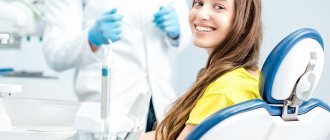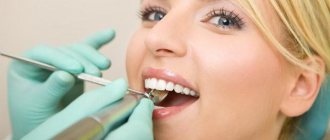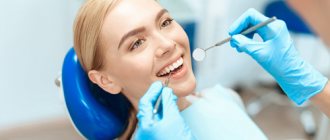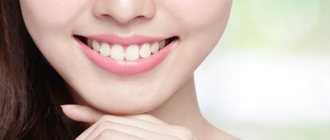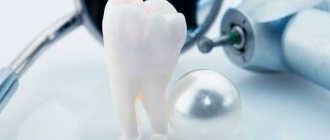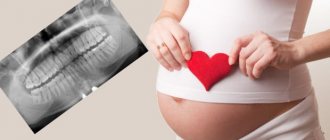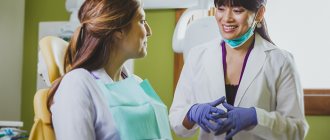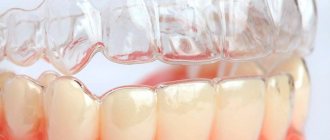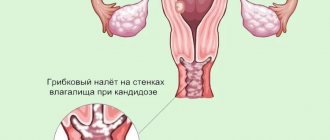The issue of going to the dentist during lactation is one of the most pressing. Dental treatment while breastfeeding is harmless, but necessary. A breastfeeding mother risks losing her teeth and passing on tooth decay to her baby by licking his spoons and pacifiers. Why does the fragility of mother’s teeth increase during this period? The fact is that, together with milk, it transfers calcium to the child, strengthening his body. At the same time, its lack in women provokes problems with the oral cavity. Therefore, the appearance of dental ailments during this period of time is not uncommon.
Content:
- Is it permissible to use local anesthetics?
- Anesthetics that can be used by nursing mothers
- Is it possible to feed a baby immediately after dental treatment is completed?
- How to reduce the likelihood of developing dental disease after childbirth
Many women experience the need for dental treatment while breastfeeding. This is due to the increased load on the body of a young mother, calcium deficiency, and hormonal changes. If you have a toothache, it is very important to seek qualified dental care as soon as possible. The doctor will tell you whether the disease can be treated without interrupting lactation.
Tooth extraction and lactation
If the tooth decay is so severe that there is no way to save and cure it, the doctor performs an extraction. For this, local anesthesia is used. Breastfeeding is not a reason to refuse this procedure, since in this situation there is often severe inflammation and pain. Therefore, we cannot wait. It is necessary to inform the dentist in advance about lactation so that he can select the right anesthesia and antibiotics.
There is no need to wean the baby from the breast during the period of removal and recovery. The only recommendation is for the mother to stop eating solid food.
It is impossible to delay treatment, since a decayed tooth is a source of infection that will spread throughout the body and be passed on to the child.
Is it permissible to use local anesthetics?
There is a myth that any dental painkillers are strictly contraindicated for nursing mothers. It is because of this that women put off a visit to the dental clinic - only a few are ready to treat a sore tooth without anesthesia.
In fact, local anesthetics can be used during lactation. Not all medications are suitable, but the list of safe options is wide. Therefore, the patient will definitely not have to endure severe pain during the treatment of a deep carious cavity, pulpitis or advanced inflammation.
It is very important that the patient warns the dentist in advance that she is breastfeeding. Then the doctor will be able to choose the optimal pain reliever for her.
If the upcoming intervention is very serious and requires the mandatory administration of a potent analgesic, you should discuss with your doctor the possibility of carrying out all the manipulations later - when the lactation period is over. If the disease does not tolerate delay, arguing with a specialist is not only pointless, but also harmful to health - you just need to trust him.
Often, after dental therapy, the dentist prescribes a course of antibiotics. This also confuses mothers, since all antibacterial agents are excreted in milk, which means they can pose a danger to the newborn. In fact, there is no need to worry. If the doctor is warned about lactation, he will choose exactly the medicine that will not harm the baby. But the mother’s independent refusal of antibiotic therapy can lead to serious complications.
It is important to understand: in most cases, postponing therapy until later results in serious problems. Therefore, the answer to the question of whether dental treatment is allowed during breastfeeding is affirmative. And the sooner a woman visits the dentist, the higher her chances of a speedy recovery.
Dental treatment while breastfeeding
If you are a nursing mother and are faced with dental problems, then visiting a dentist is absolutely necessary to prevent the harmful consequences of “neglected” dental health.
First you need to understand the possible causes of tooth pain during breastfeeding. There are a number of problems that can cause young mothers to feel discomfort in their teeth:
- Gingivitis
- Periodontitis
- Hypersensitivity.
- Caries and pulpitis.
This is inflammation of the gums, the causes of which can be a lack of vitamin C, smoking, decreased immunity, poor nutrition, and malocclusion. But the main reason is the proliferation of bacteria due to insufficient oral hygiene and accumulated plaque. The first symptoms of gingivitis are redness and itching of the gums, increased bleeding, inflammation and swelling.
This inflammation is one of the most severe forms of gum disease and can lead to permanent tooth loss. Such dental pathology can develop if gingivitis is not treated in time. The first symptoms are bleeding when brushing your teeth, red or swollen gums, and bad breath.
For the normal development of a child’s body, he needs a number of useful substances, including calcium. If a young mother does not receive enough microelements in her diet, then over time they will be susceptible to leaching from the body. This will lead to the destruction of enamel and increased fragility of bones, and as a result will lead to problems with teeth. The first symptoms are increased tooth sensitivity, sharp short-term pain in the teeth.
Caries are small spots on the surface of the tooth that appear due to the influence of harmful external and internal factors on the teeth and leading to inflammatory processes in the hard layers of the tooth. Pulpitis is an inflammation that flows from deep caries, which reaches the root canals and nerve endings, affecting them. Diseases of caries and pulpitis can be caused by simple non-compliance with oral hygiene, poor nutrition, as well as gastrointestinal diseases. Symptoms of these dental pathologies are acute pain from sweet or cold foods, severe aching pain that lasts 10 minutes or more.
Dental treatment under a microscope
Get an individual consultation with a specialist at the TopSmile clinic and find out whether it is possible to treat teeth during lactation
Get acquainted with the service
What to do if toothache occurs during lactation?
If you have a toothache, you should immediately contact a specialist who will conduct diagnostics to identify pathologies and give you accurate recommendations on the problem. However, due to the busy life of a nursing mother, there is not always time for an emergency trip to the doctor. This means that you don’t have to endure toothache before visiting the dentist’s office. You can reduce pain using the following procedures:
- Remove food debris that has fallen into the gaps between the teeth, which irritate the nerve upon contact;
- Apply a cotton swab moistened with Dent drops to the area with painful symptoms - this will reduce the pain and soothe the tooth;
- Rinse your mouth with solutions of furatsilin, hydrogen peroxide, chlorhexidine or potassium permanganate;
- Rinse your mouth after meals with a baking soda solution;
- Rinse your mouth with a decoction of oak bark;
- After consulting with your doctor, you can take a drug based on ibuprofen or paracetamol.
But you should not rely on the fact that such procedures will bring a long-term effect of peace and lack of discomfort. Only a dentist can prescribe real treatment that will help eradicate the source of pain and finally solve the problem. At the same time, do not forget to inform the nursing mother about your situation so that the specialist can choose the most appropriate medications for treatment and prescribe the necessary procedures that will not harm you and your baby.
What dental procedures should you avoid during lactation and why?
During the period of breastfeeding, do not forget that there are also dental procedures that you should avoid:
- Teeth whitening - it is contraindicated during lactation, since rehabilitation at this time occurs more slowly and can cause complications associated with a lack of calcium, which will lead to the appearance of enamel defects and the development of caries;
- The installation of dental implants is allowed only if the person is healthy and the body is able to endure a complex implantation operation and the adaptation period of the implant without much harm to it. During breastfeeding, women experience a lack of nutrients in the body, accompanied by weakness due to constant lack of sleep and anxiety. In addition, after implantation of dentures, the doctor must prescribe a course of antibiotics, which is undesirable for women during breastfeeding;
- Antibiotic therapy is an effective way to combat bacteria that affect the oral mucosa, which causes inflammation of the gums and pain in the teeth;
- The use of certain pain medications (analgin, citramon). The use of these drugs is prohibited, as they contain aspirin and caffeine, which are very dangerous for the child because they increase blood circulation. Analgin reduces the number of platelets and leukocytes, which leads to the destruction of bone marrow.
Is anesthesia acceptable during breastfeeding?
Today, almost every procedure related to dental treatment is performed using anesthesia. The doctor, taking into account the patient’s characteristics, selects the most suitable drug that does not cause negative reactions in his body. Anesthesia helps to get rid of pain during treatment and undergo surgery to eliminate dental pathology without experiencing discomfort and fear.
Problems that require local anesthesia:
- Root canal treatment;
- Tooth extraction;
- Removal of dental cysts;
- Fixing the pins.
It is possible to perform an anesthesia procedure for dental treatment during breastfeeding. In this case, it is necessary to choose the right anesthetics. For nursing women, short-acting local anesthetics are used, which are eliminated from the body 5-6 hours after administration and reduce sensitivity only in those places where it is necessary. These include:
- Novocaine - used in treatment with extreme caution if the intended benefit to the nursing mother outweighs the risks of harming the newborn baby;
- Lidocaine is one of the most commonly used anesthetic agents due to its low concentrations, which remain in the blood and milk of the nursing mother, and its short-lived effect;
- Articaine is also one of the relatively safe medications, characterized by minimal concentrations, due to which there is no need to interrupt breastfeeding after visiting the dentist.
If you have doubts about these drugs, you can consult a specialist who will select for you an individual anesthesia that will not harm either you or your child. But you should not abstain from the anesthesia procedure in any case, since during dental operations the body has a stress reaction, subsequently releasing adrenaline, which can cause excitement of the nervous system and tension on an emotional level in an infant.
Is it possible to feed a child after anesthesia?
Of course, you can feed a baby, but you need to remember precautions and know that anesthesia is finally removed from the body only after 5-6 hours. Therefore, you should follow the advice of doctors who recommend feeding the baby before the procedure and stocking up on breast milk. After anesthesia, you should drain the milk, which may have contained some of the anesthesia drug, by feeding the baby with milk that was expressed earlier.
Prevention of caries during lactation.
During lactation, women experience enormous stress on the body, but no one is immune from the occurrence of any diseases or pain. Therefore, it is worth following some recommendations to prevent situations that can negatively affect your health, psychological state and mood:
- Follow the rules for oral care and hygiene;
- Reduce consumption of sweet foods;
- Brush your teeth regularly with a quality brush and toothpaste without harmful chemicals;
- Do not consume too cold or hot foods and drinks;
- After each meal, rinse;
- Be sure to include in your diet foods rich in microelements and vitamins;
- Periodically visit the dentist's office to check the condition of the dentition and further consultation on maintaining dental health.
Anesthetics that can be used by nursing mothers
In dentistry, pain relief is usually classified into general and local. In the first case, we are talking about anesthesia - intravenous or inhalation. Local anesthesia is the numbing of an inflamed area using an injection, gel or spray. It is highly undesirable to use general anesthesia when providing dental care to nursing mothers. If this cannot be avoided, then until complete recovery the woman should feed the baby with a special infant formula or pre-prepared breast milk.
Among the local anesthetics used by dentists are:
- Novocaine. Allowed during lactation only in cases where the expected benefit for the woman is much higher than the possible risks for the baby. Before administering the solution to the patient, the dentist must weigh the pros and cons. Sometimes the medication causes negative side effects: headaches, weakness, drowsiness, convulsions, dizziness, arrhythmia, bradycardia, swelling of the lips.
- Lidocaine. The official instructions state that only a doctor can prescribe medicine to breastfeeding women. The drug passes into milk in very small quantities, and its oral bioavailability is low. This means that the amount of active substance that is released in milk is minimal. Therefore, the potential harm to the child is low. Possible adverse reactions after the administration of lidocaine: numbness of the tongue, convulsions, drowsiness, tinnitus, blurred vision, angioedema, urticaria and some others.
- Articaine. A product approved for both pregnant and lactating women. Dentists use it if they need to perform infiltration or conduction anesthesia. Side effects of the drug include: nausea, vomiting, dizziness, low blood pressure, allergies.
Attention! Nursing mothers are prohibited from administering anesthetics that contain high amounts of adrenaline. Such drugs negatively affect the baby’s health, in particular, they provoke negative changes in the child’s cardiac activity.
Safe anesthetic drugs for breastfeeding used in dentistry
In dentistry, there are two types of anesthesia:
- general (anesthesia), which is used for surgical interventions and can be inhaled or intravenous;
- local, which can be in the form of a spray (gel), the effect of which does not exceed twenty minutes, and injection.
Sprays (gels) are usually used to locally numb the area of the gum where the anesthetic will be injected.
Novocaine
This drug is used during lactation with extreme caution and only in cases where the expected benefit for the nursing mother significantly outweighs the possible risk of unpleasant consequences for the baby.
Lidocaine
Despite the warning in the instructions for the drug about the undesirability of use during lactation, dentists quite often use it in their practice. This is explained by its local and short-lived effect, as well as the minimum concentration of the active substance, both in the blood and in breast milk. That is why Lidocaine is considered relatively safe for a baby during the treatment of his mother.
Artikain
The drug is acceptable for use during lactation. At the same time, doctors note that there is no need to interrupt feedings for a long period, since critical indicators of its concentration in milk are not detected.
IMPORTANT. When breastfeeding, the use of anesthesia with a high content of adrenaline is contraindicated.
Is it possible to feed a baby immediately after dental treatment is completed?
Ideally, three to five hours should pass between the administration of the anesthetic and the application of the crumbs to the breast. Knowing this, a woman can prepare a portion of milk for one feeding.
During a forced break in lactation, it is recommended to pump. This simple measure will eliminate the occurrence of painful and unpleasant sensations.
After surgery or procedure
The anesthesia is quickly eliminated from the body. If you have questions about the anesthesia you received, contact your anesthesiologist (the doctor who gives you the anesthesia).
You should start expressing milk again as soon as you are awake and able to do so. If you need help, ask someone on your health care team. You can also ask family or friends for help while you recover from surgery or procedure.
While you're away from your baby, plan to pump every 3 to 4 hours, or at least as often as you would normally feed your baby. Frequent pumping will help you maintain your breast milk supply until you are able to breastfeed again.
If you have questions about any of the medications you will receive after your surgery or procedure, ask your healthcare provider. You can also browse the websites or call the phone numbers listed in the Before Your Surgery or Procedure section.
to come back to the beginning
How to reduce the likelihood of developing dental disease after childbirth
In order not to worry once again about dental diseases during the difficult period of recovery of the body after childbirth, it is important to follow the recommendations:
- At the pregnancy planning stage, cure all existing oral diseases.
- If caries appears, consult a doctor immediately. While the carious cavity is small, it can be treated absolutely painlessly without the use of anesthetics.
- Always practice good oral hygiene.
- Get routine checkups at your dentist's office twice a year.
Women who care about the health of their smile are much less likely to encounter the need for dental treatment during lactation.
How to care for your teeth during pregnancy?
In the early stages of pregnancy, the best protection for teeth is careful care and the use of toothpastes containing fluoride. Choose toothpastes without whitening effect. We also recommend contacting the clinic at the first appearance of toothache. We remind you that a mother’s bad teeth threaten her child:
- infection (pathogenic microorganisms cause complications in the development and formation of the fetus),
- hypoxia (periodontal damage leads to intoxication and inflammation).
For the health of the unborn child, it is necessary to maintain good oral health of the mother.
When can caries be treated during pregnancy?
When is the best time to treat caries during pregnancy? If a woman did not have time to sanitize her oral cavity before conception, she will now have to wait until 3 months of pregnancy and try to complete treatment before the 6th month of fetal development.
To understand why doctors treat caries in pregnant women at this particular time, you need to know what happens in each trimester of this period:
- From conception to 12 weeks is the most responsible and important time in the development of the fetus, because it is in the first trimester that the most important organs of the child are laid and the placenta is formed. Before the formation of a protective barrier in the form of the placenta, the fetus is still poorly protected and many drugs are contraindicated for use in the treatment of the expectant mother.
- In the second trimester (up to 24 weeks), there is already a placenta around the fetus - this period is ideal for treating caries during pregnancy.
- In the third trimester (from 25 weeks until the birth of the baby), treatment of caries and its complications during pregnancy may already be accompanied by risks. An already weakened body, a greatly distended uterus with increased sensitivity to the effects of drugs and stress - all this can cause untimely onset of labor.
Neither a doctor, nor even a woman would want to risk the baby’s health, but there are situations when a pregnant woman urgently needs emergency dental care. In these situations, it is possible to treat pulpitis, periodontitis, periodontal diseases and even remove teeth, but under the supervision of a whole team of doctors and after careful selection of drugs and preparation of the woman.
In less urgent situations, when there is no acute pain, it is better to postpone treatment of caries during pregnancy until after childbirth. Nursing mothers are also not recommended to use strong painkillers, but during the period of treatment and removal of drugs from the body, you can prepare milk that has been expressed in advance for the baby. Then it will be possible to treat teeth even under the most powerful anesthesia.
Safe dental diagnostics during pregnancy
Many diagnoses in dentistry can be made only on the basis of a survey and examination of the patient. In controversial cases and in order to distinguish diagnoses with similar symptoms, an X-ray examination is required. To avoid exposing the baby to radiation, pregnant women undergo digital radiovisiography. This procedure has 90% less radiation exposure than traditional radiography.
If this is not possible in the clinic, then exposure can be reduced by using a lead apron.
Nuances of dental treatment for pregnant women
It is possible to treat teeth during pregnancy, but taking into account its duration and characteristics of the course. A competent assessment of the woman’s general health is also important. What besides caries is included in the list of diseases that can be treated by a dentist?
- If treatment of caries in pregnant women is not carried out in a timely manner, it will be complicated by pulpitis, periodontitis, and inflammatory lesions of periodontal tissue. While carrying a child, women can develop stomatitis, glossitis, cheilitis, periodontitis, periostitis, sinusitis, and abscess. In case of accidental injuries, various injuries can occur - chips and fractures of teeth and roots.
- Caries during pregnancy, as in any other period of life, is treated only by preparation (drilling) and filling. The only exception is caries in the initial stage - the spot stage. The dentist is free to use any filling materials except amalgam. Light-curing polymer fillings are not contraindicated for pregnant women, and the light from light-curing polymer lamps is completely safe.
- Any pain is dangerous - it is not only stress, but also increases the likelihood of injury due to fear or reflexive movement. Dental procedures that may be accompanied by unpleasant sensations. Should always be performed only after proper pain relief. Since general anesthesia is practically contraindicated for pregnant women, it remains possible to treat caries and other diseases under local anesthesia.
- Whitening and straightening of teeth, implants and dentures that require preliminary tooth preparation will have to be postponed. Although removable dentures can be made and worn even by pregnant women.
What does caries treatment look like during pregnancy?
A pregnant woman’s visit to the doctor also has some features:
- The dental chair tilts at an angle of 15°. If the woman is already quite advanced in pregnancy, then she is asked to lie reclining on her left side. The patient lies down comfortably and relaxed so as not to overstrain the abdominal muscles.
- The dentist offers the safest procedures, manipulations and medications for the baby and expectant mother.
- If the diagnosis, clinical conditions and the patient’s capabilities allow it, then it is better to treat caries during pregnancy using a non-contact method - laser, ozone or remineralization (at the spot stage).
- For better treatment, the use of a dental microscope is recommended. It increases the intervention area by 30 times, increasing the accuracy of the doctor’s work.
- If a woman goes to the dentist in the last stages of pregnancy, the doctor can recommend a number of preventive measures that will stop the development of the disease and wait until childbirth to carry out full treatment.
Procedures that should not be done
- Installation of veneers or aesthetic fillings
Although it is not considered a risky procedure, it is nevertheless not recommended. The reason is that any medical interventions during pregnancy should be carried out only when indicated. Aesthetic problems can be solved after the birth of a child.
- Whitening
The reason is the same - the procedure is not therapeutic - it can be postponed until later. In addition, now all medical drugs and equipment are certified; for this purpose, studies are carried out, in which pregnant women usually do not participate. Therefore, there is a formal ban.
- Treatment by an orthodontist
It would seem that wearing braces while on maternity leave is a great idea, because you don’t have to go to work or communicate with colleagues. But in fact, many orthodontists are against this decision. Firstly, during pregnancy and subsequent breastfeeding, bone tissue density may temporarily decrease and the course of treatment will differ from the standard. It is difficult to predict this, so to some extent such a procedure is risky. Secondly, immediately after the birth of a child, a woman cannot always leave him to go to the clinic for an appointment on the appointed day. And it is very undesirable to postpone visits to the orthodontist - it is not recommended to violate the treatment schedule.
It is much easier to choose clear aligners that are invisible to others, and undergo treatment when it is truly convenient for you.
There is no need to “hide” with aligners; the treatment goes unnoticed by others
Thus, the general opinion of dentists is:
- Treatment should be carried out before pregnancy or after 12 weeks.
- Do not put off treatment until later.
- On the contrary, all aesthetic procedures can be completed after the birth of the baby.
Other articles:
- What is more profitable – aligners or braces?
- Reflections braces - their advantages
